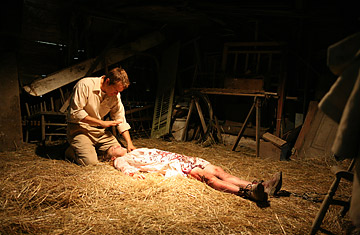
A scene from The Last Exorcism
Early on in the wittily self-aware new horror movie The Last Exorcism, the Rev. Cotton Marcus (Patrick Fabian) remarks that he used to dream of having his own TV ministry. While he shares this now dead dream with us, he's grooming himself for a different kind of performance: his last purported exorcism, which he plans to have a documentary crew film in order to expose what hooey such rituals are. Looking in the mirror, he smirks a little at the filmmakers — as if to say, can you believe I was such a creep? Then he delivers his punch line in a far more somber tone: "And now, frankly, all I really want is health insurance."
Amen, brother. What independent contractor doesn't long for benefits? A man very much of these times, Cotton is that rarity in the horror genre: a genuinely intriguing character. Director Daniel Stamm's The Last Exorcism is itself fairly shallow — the ending yields not only no real answers, but worse, no real mystery to debate on your way home from the cinema. But Fabian, an actor whose lengthy résumé has been largely limited to television work (he plays Bill's brother-in-law on Big Love), gives such a cunning performance that for once, when you're whispering "Don't go in there," you actually mean it. We can relate to Cotton's love of family — he and his wife (Shanna Forrestall) are crazy about their cute 10-year old son, who suffers from a variety of ailments as a result of having been born prematurely. But it is Cotton's mood that really woos us; he has that recognizable giddiness that tends to accompany a person who is quitting a job they're emotionally done with.
Preaching is the only profession Cotton has ever known; his preacher father put him on the pulpit as a kid, where he turned out to be a born entertainer with a gift for godly gab. Exorcisms, also a family business, are highly profitable, but he feels guilty about his part in perpetuating the practice, which he assures us is a scam — one that "is bigger than it's ever been." Cotton has never believed demons are real; his approach to exorcism has been to treat it as a sort of religious psychoanalysis session, waving his cross around while delivering advice on how to get rid of practical problems. What worries him are his colleagues who do have faith, like the one who suffocated a young boy while trying, overzealously, to exorcise his autism. By acting out the fraud on camera, he hopes to bring down the exorcism industry.
That setup, of course, demands that Cotton discover the exact opposite on his last job: that demons do exist, and that he, faithless though he is, will be forced to try to make his usual sham exorcism actually work. With the camera rolling, Cotton picks his final client randomly from his mailbox, via a letter marked urgent. She's Nell Sweetzer, a 14-year-old girl who lives on a remote farm in Louisiana. Her father Louis (Louis Herthum) believes she's been killing his livestock. (Cotton rolls his eyes at that old line.) Along with the documentary director Iris (Iris Reisen) and a cameraman, he hits the road for the Bayou, demonstrating his cynicism by slapping a fish symbol on his car for appearances' sake just before they drive away.
Arriving at the Sweetzer farm, they're greeted by the girl's gangly, pallid brother, Caleb (Caleb Landry Jones), who gives off an unsettling vibe far creepier than Nell (Ashley Bell), a quavering innocent. Playing a possessed girl doesn't exactly represent a starmaking breakthrough, but Bell, who looks a bit like Amy Adams, shows talent. In between drowning baby dolls, bludgeoning cats and twisting her body into some impressively unnatural positions — supposedly all done by yoga rather than computer trickery — Bell projects the earnestness and vulnerability that we need to see in order to believe that Cotton wouldn't just flee the scene.
Like The Blair Witch Project and this year's Paranormal Activity, The Last Exorcism purports to be found documentary footage, now officially an overworked ploy. But it plays with the notion of doubt longer than either of its predecessors did. Because we know Cotton is a practiced scammer himself and not the type to get hysterical, we stick with him all the way to the bloody, murky and sadly deflating end (it's nothing more than pro forma Satan silliness). It's a shame that the pop culture conversation about The Last Exorcism is likely to center more on the viral campaign leading up to its release — like the distributor's successful effort to hijack Chatroulette, or producer Eli Roth's taped pleas to preview audiences to use their power as "Twit-ics" to spread the word. Rather than these gimmicks, filmmakers could have relied on Cotton, and Fabian's engaging portrayal of him, to provide the real lure.
